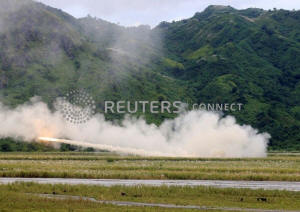Exclusive: U.S. pushes arms sales surge to 'Fortress Taiwan,' needling
China
 Send a link to a friend
Send a link to a friend
 [September 16, 2020]
By Mike Stone and Patricia Zengerle [September 16, 2020]
By Mike Stone and Patricia Zengerle
WASHINGTON (Reuters) - The United States
plans to sell as many as seven major weapons systems, including mines,
cruise missiles and drones to Taiwan, four people familiar with the
discussions said, as the Trump administration ramps up pressure on
China.
Pursuing seven sales at once is a rare departure from years of precedent
in which U.S. military sales to the island were spaced out and carefully
calibrated to minimize tensions with Beijing.
But the Trump administration has become more aggressive with China in
2020 and the sales would land as relations between Beijing and
Washington are at their lowest point in decades over accusations of
spying, a lingering trade war and disputes about the spread of the novel
coronavirus.
At the same time Taiwan's desire to buy weapons increased after
President Tsai Ing-wen was re-elected in January and has made
strengthening Taiwan's defenses a top priority.
Taiwan is China's most sensitive territorial issue. Beijing says it is a
Chinese province, and has denounced the Trump administration's support
for the island.

Washington has been eager to create a military counterbalance to Chinese
forces, building on an effort known within the Pentagon as "Fortress
Taiwan", as Beijing's military makes increasingly aggressive moves in
the region.
The Taipei Economic and Cultural Representative Office in the United
States did not respond to a request for comment.
Taiwan's military is well-trained and well-equipped with mostly
U.S.-made hardware, but China has a huge numerical superiority and is
adding advanced equipment of its own.
The weapons packages from Lockheed Martin Co <LMT.N>, Boeing <BA.N> and
General Atomics are moving their way through the export process, three
people familiar with the status of the deals on Capitol Hill said, and a
notification to Congress is expected within weeks.
One industry source said President Donald Trump was slated to be briefed
on the packages this week by Secretary of State Mike Pompeo. Some of the
deals had been requested by Taiwan more than a year ago, but are only
now being moved through the approval process. A State Department
spokesman declined comment.
A senior U.S. official, citing Chinese assertiveness in the Taiwan
Strait, said: "There is no equilibrium today. It is out of balance. And
I think that is dangerous."
Trump's White House has made an effort to export weapons to U.S.
allies trying to bolster their defenses, decrease dependence on U.S.
troops while boosting U.S. companies and jobs.
As he fights for re-election on Nov. 3, Trump and Republican supporters
have ramped up their rhetoric against Beijing and sought to portray
Democratic opponent Joe Biden as soft on China.
[to top of second column]
|

U.S. military forces fire a High Mobility Artillery Rocket System (HIMARS)
rocket during the annual Philippines-US live fire amphibious landing
exercise (PHIBLEX) at Crow Valley in Capas, Tarlac province, north
of Manila, Philippines October 10, 2016. REUTERS/Romeo Ranoco/File
Photo

Other factors include Taiwan's bigger defense budget, and the fear
in Taiwan that if Trump loses, Biden would be less willing to sell
the U.S.'s most advanced weapons to them.
Taiwan's interest in U.S. weapons and equipment is not new. The
island is bolstering its defenses in the face of what it sees as
increasingly threatening moves by Beijing, such as regular Chinese
air force and naval exercises near Taiwan.
The senior U.S. official said Taiwan's increased defense spending
was a good step, but it had to do more.
"Taiwan, frankly, needs to do more in order to ensure that they
indigenously have an ability to deter Chinese aggression," the
official said.
DEALS
Drones that can see over the horizon for surveillance and targeting,
coupled with advanced missiles and coastal defenses that include
smart mines and anti-submarine capabilities to impede a sea
invasion, have been discussed at the highest levels to make Taiwan
more difficult to attack, like a "porcupine", according to industry
and congressional sources.
A Lockheed Martin-made High Mobility Artillery Rocket System (HIMARS),
essentially a truck-based rocket launcher, is among the weapons
Taiwan wants, people familiar with the negotiations said. Taiwan
also seeks to buy sophisticated anti-tank missiles.
In early August, Reuters reported that Washington is negotiating the
sale of at least four of its large sophisticated aerial drones to
Taiwan for what could be about $600 million.
Also under discussion are land-based Boeing-made Harpoon anti-ship
missiles to serve as a coastal defense against cruise missiles.

Other systems include "underwater sea mines and other capabilities
to deter amphibious landing, or immediate attack," Taiwan's de facto
ambassador to United States said in July.
(Reporting by Mike Stone in Washington; additional reporting by
Idrees Ali and Patricia Zengerle in Washington, and Ben Blanchard in
Taipei; Editing by Chris Sanders and Grant McCool)
[© 2020 Thomson Reuters. All rights
reserved.] Copyright 2020 Reuters. All rights reserved. This material may not be published,
broadcast, rewritten or redistributed.
Thompson Reuters is solely responsible for this content. |